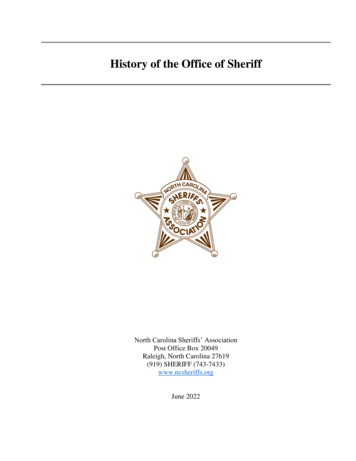
Transcription
History of the Office of SheriffNorth Carolina Sheriffs’ AssociationPost Office Box 20049Raleigh, North Carolina 27619(919) SHERIFF (743-7433)www.ncsheriffs.orgJune 2022
Contents1.Introduction . 12.The Beginning: The Middle Ages . 13.The Office Grows . 14.The Sheriff Crosses the Atlantic . 25.The Sheriff Today . 25.1Law Enforcement . 25.2Court Duties . 35.3Service of Civil Process . 35.4Jail Administration . 36.Longest Serving Sheriffs . 37.No Felon as Sheriff in North Carolina . 4North Carolina Sheriffs’ AssociationHistory of the Office of SheriffJune 2022
1.IntroductionMention the word “sheriff” and many think of shootouts and gunfights in the Wild West. Such isthe power of old movies and television series, which have so magnified the role of the nineteenthcentury American sheriff that it is now virtually impossible to think of sheriffs as existing in anyother place or time. Most people would be surprised to know that the Office of Sheriff has a proudhistory that spans well over a thousand years, from the early Middle Ages to our own “high-tech”era.With few exceptions, today's sheriffs are elected officials who serve as the chief law-enforcementofficer of a county. Although the duties of the sheriff vary from jurisdiction to jurisdiction, thesheriff's office is primarily responsible for: (1) law enforcement; (2) the courts; (3) service of civilprocess; and (4) jail administration.2.The Beginning: The Middle AgesMore than twelve hundred years ago, the country we now call England was inhabited by smallgroups of Anglo-Saxons who lived in rural communities called “tuns.” “Tun” is the source of themodern English word town. These Anglo-Saxons were often at war. Sometime before the year700, they decided to organize their methods of fighting by forming a system of local selfgovernment based on groups of ten. Each tun was divided into groups of ten families, calledtithings. The elected leader of each tithing was called a tithingman. The tithings were also arrangedin tens. Each group of ten tithings (or one hundred families) elected its own chief. The AngloSaxon word for chief was “gerefa,” which later became shortened to “reeve”.During the next two centuries, a number of changes occurred in this system of tithings andhundreds. A new unit of government, the shire, was formed when groups of hundreds bandedtogether. The shire was the forerunner of the modern county. Just as each hundred was led by areeve (chief), each shire had a reeve as well. To distinguish the leader of a shire from the leader ofa mere hundred, the more powerful official became known as a shire-reeve.The word shire-reeve eventually became the modern English word sheriff. The sheriff—in earlyEngland, and metaphorically, in present-day America—is the keeper, or chief, of the county.3.The Office GrowsOriginally, tuns had ruled themselves through the election of tithingmen and reeves. Over theyears, however, government became more centralized and concentrated in the power of a singleruler, the king. The king distributed huge tracts of land to various noblemen, who thereby becameentitled to govern those tracts of land under the king's authority. Under this new arrangement, itwas the noblemen who appointed sheriffs for the counties they controlled. In those areas notconsigned to noblemen, the king appointed his own sheriffs.Over the next few centuries, the sheriff remained the leading law enforcement officer of the county.To be appointed sheriff was considered a significant honor. The honor, however, was a costly one.If the people of the county did not pay the full amount of their taxes and fines, the sheriff wasrequired to make up the difference out of his own pocket. Furthermore, the sheriff was expectedto serve as host for judges and other visiting dignitaries, providing them with lavish entertainmentat the sheriff’s own expense.North Carolina Sheriffs’ AssociationHistory of the Office of SheriffPage 1 of 4June 2022
4.The Sheriff Crosses the AtlanticWhen English settlers began to travel to the New World, the Office of Sheriff traveled with them.Records show that one of the early Virginia counties elected a sheriff in 1651, but most colonialsheriffs were appointed at that time. Unlike their English counterparts, American sheriffs were notexpected to pay extraordinary expenses out of their own pockets. Some sheriffs—most of whom werewealthy men to begin with—even made money from the job.Throughout the eighteenth and nineteenth centuries, American sheriffs were assigned a broad rangeof responsibilities by colonial and state legislatures. Some of these responsibilities, such as lawenforcement and tax collection, were carried over from the familiar role of the English sheriff. Otherresponsibilities, such as overseeing jails and workhouses, were new.When confinement became favored as a more civilized way to deal with criminals, authorities inmedieval England introduced the county jail. They began to experiment with other sorts of facilitiesas well. Among these were the workhouse, where minor offenders were assigned useful labor, and thehouse of correction, where people who had been unable to function in society could theoretically betaught to do so. All three of these institutions were brought to colonial America, and the responsibilityfor managing them was given to the colonies' ubiquitous law enforcement officer, the sheriff.As Americans began to move westward, they took with them the concept of county jails and the Officeof Sheriff. Here it is said that sheriffs fell into two categories, the quick and the dead. Most westernsheriffs, however, kept the peace by virtue of their authority rather than their guns. With a fewexceptions, sheriffs resorted to firepower much less often than is commonly imagined.5.The Sheriff TodayThere are 3,006 counties in the United States today, and almost every one of them has a sheriff. Somecities have sheriffs as well, such as Denver, St. Louis, Richmond, and Baltimore. Currently, thereare 3,081 sheriffs across the United States.In the majority of states, the Office of Sheriff is established by the state constitution. Most of theremaining states have established the office by an act of state legislature. Alaska, Connecticut, andHawaii are the only states in which the Office of Sheriff does not exist.There are only two states in which the sheriff is not elected by the voters. In Rhode Island, sheriffsare appointed by the governor, and in Hawaii, deputy sheriffs serve in the Department of PublicSafety’s Sheriff’s Division.Today, there is no such thing as a “typical” sheriff. Some sheriffs still have time to drop by the towncoffee shop to chat with the citizens each day, while others report to an office in a skyscraper andmanage an office whose budget exceeds that of many corporations. Despite their differences in style,however, most sheriffs have certain roles and responsibilities in common.5.1Law EnforcementAlmost all sheriffs’ offices have a responsibility for law enforcement. Although the authority of thesheriff varies from state to state, a sheriff always has the power to make arrests within his or her owncounty. Some states extend this authority to adjacent counties or to the entire state. Many sheriffs’North Carolina Sheriffs’ AssociationHistory of the Office of SheriffPage 2 of 4June 2022
offices also perform routine patrol functions such as traffic control, accident investigations, andtransportation of prisoners.5.2Court DutiesIn every state in which the office exists, sheriffs are responsible for maintaining the safety andsecurity of the court. A sheriff or deputy may be required to attend all court sessions; to act as bailiff;to take charge of juries whenever they are outside the courtroom; to serve court papers such assubpoenas, summonses, warrants or writs; to extradite prisoners; to enforce money decrees (such asthose relating to the garnishment or sale of property); to collect taxes; or to perform other courtrelated functions.5.3Service of Civil ProcessAnother duty of the Office of Sheriff in most states is serving individuals with civil court documents,which is also known as civil process. These documents can include summonses, writs of possession,foreclosures, executions, claim and deliveries, subpoenas, restraining orders, child custody orders,show cause orders and child support warrants.5.4Jail AdministrationMost sheriffs’ offices maintain and operate county jails, detention centers, detoxification centers andcommunity corrections facilities such as work-release group homes and halfway houses. Sheriffs,and the detention officers under their authority, are responsible for supervising inmates andprotecting their rights. They are also responsible for providing inmates with food, clothing, exercise,recreation, and medical services.6.Longest Serving SheriffsThe late Sheriff R.W. Goodman of Richmond County holds the honor of North Carolina’s longestserving sheriff that we are aware of. He was elected in 1950 and retired in 1994 after 44 years ofservice. At the time of his retirement, Sheriff Goodman was the second longest-serving sheriff inAmerica, and that remained the case for nearly twenty more years. 1The longest serving Sheriff in United States history is believed to be Sheriff Bernard Shackleton ofLunenburg County, Virginia who served from 1904 to 1955, a total of 51 years.2 In 1903, he decided torun against his boss and incumbent sheriff, C.S. Bagley, who had hired Shackleton as a deputy when hewas first elected. Shackleton defeated his former boss in that election and remained sheriff until hisretirement at the age of 83 in 1955.3More recently, the late Sheriff Dwight Radcliff of Pickaway County, Ohio nearly surpassed the record,having served from 1965 to 2013, a total of 48 years. Sheriff Radcliff was first elected in 1964 and wasre-elected 12 times. In 1987-1988, he served as President of the National Sheriffs’ Association. He waspreceded in office by his father (Charles Radcliff), who served as sheriff from 1931 to 1961.4 UponPerlmutt, David. “Richmond County’s Goodman: The last of the old-style sheriffs.” Charlotte Observer. May 26. 1991.FBI Law Enforcement Bulletin. January, 1946.3 Editor’s Note: Information received from the Lunenberg County Sheriff’s Office.4 Eckert, Kristy. “Lawman for Life: 40-Year Ohio Sheriff Ranks as Nation’s Longest Serving.” Columbus Dispatch. Reprintedin Sheriff. September-October, 2005. Editor’s Note: The preceding article name is in error.12North Carolina Sheriffs’ AssociationHistory of the Office of SheriffPage 3 of 4June 2022
Sheriff Dwight Radcliff’s retirement in 2013, his son (Robert Radcliff) succeeded him as sheriff.5As of the date of this publication (June 2022), Sheriff Cullen Talton of Houston County, Georgia, whotook office on January 1, 1973, is serving his 49th year as sheriff at age 90.6Longest Serving Sheriffs in AmericaNameCounty/StateBernard ShackletonCullen TaltonLunenburg County, VirginiaHouston County, GeorgiaDwight RadcliffR.W. GoodmanPickaway County, OhioRichmond County, NorthCarolinaBamberg County, SouthCarolinaEd Darnell7.EnteredOffice19041973Years of 9782020425149 4844No Felon as Sheriff in North CarolinaUntil 2010, there was no North Carolina constitutional provision prohibiting a convicted felon from beingelected or appointed sheriff. On July 1, 2010, with the support of the North Carolina Sheriffs’ Association,the North Carolina General Assembly enacted House Bill 1307 (Session Law 2010-49), which allowedvoters to decide whether or not the North Carolina Constitution should be amended to prohibit a convictedfelon from being elected or appointed sheriff. Senator Stan Bingham (R-Davidson County) was the mainproponent of this legislation and he worked tirelessly, with the support of Senate President Pro TemporeMarc Basnight (D-Dare County), to get it enacted into law.In the statewide election on November 2, 2010, voters passed an amendment to the North CarolinaConstitution overwhelmingly by 85% prohibiting anyone who has been convicted of a felony from servingas sheriff in this State. The constitutional amendment was approved in each and every of North Carolina’s100 counties, by margins of between 71% and 90%. Moreover, to be prohibited from serving as sheriff,the individual does not have to be convicted of the felony in North Carolina—any conviction, anywhere,disqualifies the felon from serving as sheriff in North Carolina.In 2018, a previous sheriff who was a convicted felon that had his felony convictions expunged filed forcandidacy to run for sheriff in North Carolina. The expungement the individual obtained was not basedupon a pardon of innocence or a judicial determination of innocence. Fortunately, he was defeated in theelection primary.The North Carolina Sheriffs’ Association assisted in the drafting of and supported legislation in the 20212022 General Assembly, effective October 1, 2021, that clarifies that any convicted felon that later hasthat conviction expunged is still barred from holding the Office of Sheriff. The only exception to this ruleis if the individual obtained an unconditional pardon of innocence. The legislation also requires anycandidate for, or appointee to, the Office of Sheriff to provide a disclosure statement, prepared by theNorth Carolina Sheriffs’ Education and Training Standards Commission, verifying that the candidate orappointee has no prior felony convictions or expungements for felony convictions.White, Chris. “Longtime Pickaway County Sheriff Dwight E. Radcliff Dies at 87.” ABC 6. May 6, 2020.Purser, Becky. “Longest ‘Actively-Serving’ Sheriff Qualifies for Re-Election.” Macon Telegraph. Reproduced by AssociatedPress. March 14, 2020.56North Carolina Sheriffs’ AssociationHistory of the Office of SheriffPage 4 of 4June 2022
Safety's Sheriff's Division. Today, there is no such thing as a "typical" sheriff. Some sheriffs still have time to drop by the town coffee shop to chat with the citizens each day, while others report to an office in a skyscraper and manage an office whose budget exceeds that of many corporations. Despite their differences in style,









![Office 2010 Professional Plus Com Ativador Serial Keyl [EXCLUSIVE]](/img/61/office-2010-professional-plus-com-ativador-serial-keyl-exclusive.jpg)

